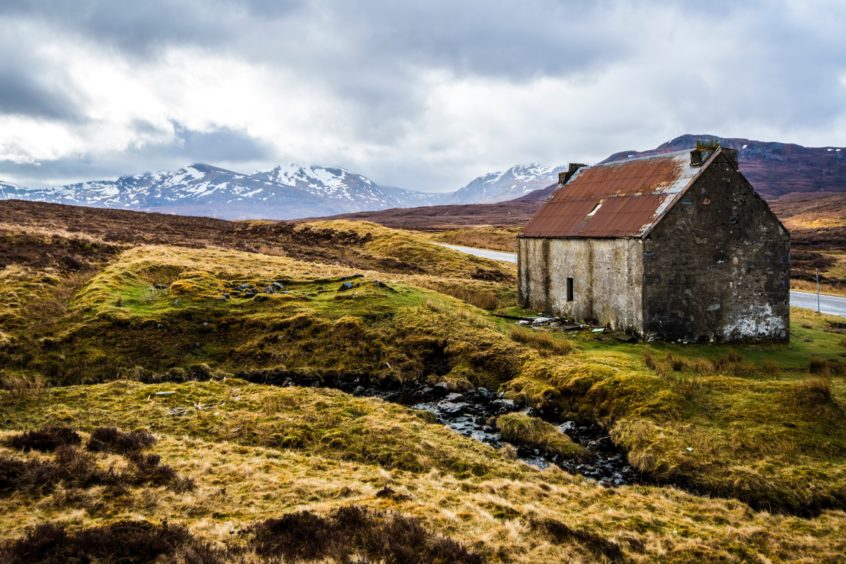
This happened some time ago, before we all found ourselves facing a rather long period of enjoying our own company.
Three friends had gone for a hike in a remote part of Argyll. It was a rugged and beautiful part of the country – a landscape dominated by towering Munros, with weather to match. And that was the source of the problem.
They were all experienced hillwalkers and had all the right equipment – these were not the sort of people to tackle the mountains in trainers and open-neck shirts. They had also notified friends of exactly where they would be going and when they would expect to be back.
But the weather in Scotland is something that nobody – not even the most well-prepared of us – can do anything about. And the weather on this occasion, having started benignly – it was early March – had decided to revert to mid-winter.
In most countries, such U-turns are rare: in Scotland they are our normal lot, and we should simply accept it. It is best not to complain too much about the weather. As the poet WH Auden puts it, weather “is what nasty people are nasty about and the nice show a common joy in observing.”
And on this expedition, nobody complained about the weather, even as the sky in the west grew steadily darker and the prospect of snow became not only possible but probable.
The walkers were all young and fit. One of them, Angus, was a marathon runner, and his friends, Mags and Jamie, an engaged couple from Glasgow, both teachers, regularly ventured out on to the hills. If they needed to get down quickly they would be able to do so, although even when they reached the road that snaked through the glen they would have a six-mile walk to the place where they had left the car.
The snow came on. It fell softly at first, and then in heavy veils, silencing the air around them, covering the ground with layers of white.
“This is serious,” said Angus. “I suppose we’d better head down.”
They started their descent – they had been following a high ridge – but it was a slow and treacherous business. In the blizzard conditions they could barely make out what lay more than a few feet ahead of them, and they knew that there were sharp drops not far away. Eventually Angus suggested that they should stop and take stock. “It’s too dangerous to go down in this,” he said.
Mags and Jamie agreed. “Isn’t there a bothy not far away?” asked Jamie.
Angus nodded. “We could probably find it – if that’s what you want.”
It was, and so they abandoned their descent and headed instead further long the ridge where, tucked away on the sheltered side, was a small stone bothy, used occasionally by climbers. It was weather-tight and had a stack of dry wood beside its fire place. There were four rudimentary beds, one in each corner of the room, on each of which was a mattress covered with striped ticking and stuffed with coir.
“Five stars,” said Angus, as they left themselves in. “You don’t expect a mattress.”
They lit a fire, peeled off their outer layers of clothing, and settled themselves for their stay. Angus had managed to get a signal, and had sent a message to friends, telling them that they were staying in the bothy for the night and would be down the following day, once the storm had blown over.
They looked at one another. “What are we going to do?” asked Jamie. “Has anybody brought any cards?”
Angus and Mags shook their heads.
Jamie looked at his watch. “It’s five now. We’ve got 14 hours, I imagine. We may as well make the most of it.”
Angus and Mags stared at him. “Well, there’s not much we can do,” said Angus.
“We could talk to one another,” suggested Mags.
“About what?” asked Jamie. “Haven’t we already said just about everything we have to say to one another?”
“Possible,” agreed Angus. “But we could always…” He hesitated before continuing. “We could always tell one another stories. Just like the Decameron.”
Jamie frowned. “The Decameron?”
“Yes. Boccaccio’s Decameron. He was an Italian writer and he told the story of a group of friends who leave Florence to get out of the way of plague. This was in the 14th Century.
“They went to stay in a house in the country and they told one another stories to keep one another entertained. There were ten of them and each of them told 10 stories.”
Mags raised an eyebrow. “10?”
“Yes,” said Angus.
“Are you suggesting we tell one another ten stories?” asked Jamie.
“I haven’t got 10,” said Mags.
“But you will have one,” said Angus. “Everybody has at least one story.”
“Perhaps,” said Mags. She turned to Jamie. “How about you, Jamie? Have you got a story?”
Jamie smiled. “More than one.”
“We can start with one,” said Angus. “And, if you like, I’ll kick off.”
“Yes,” said Mags. “You kick off, Angus, and then I’ll follow you. Jamie can be last.”
“Do they have to be true?” asked Jamie.
Angus hesitated. “Yes, let’s make them true – or true-ish.”
“What’s the difference?” asked Mags. “Either something is true, or it’s not true. How can anything be true-ish?”
Angus thought for a moment. “No, you’re right – or should I say, right-ish.”
They all laughed. Then Angus began.
“All right,” he said. “Here’s my story.
“Or rather, this is not about me, but it’s about somebody I know. His name’s Richard – and I haven’t changed that. That’s what he really is called – Richard – and he lived in Glasgow, in a small flat in the West End. He lived there with his girlfriend, Estelle, who worked for an advertising company.
“She had been very successful and – she knew it. She was a dominant type, you see. I don’t know whether the expression alpha-female exists or not, but that was what she was.
“Now, Richard was the opposite. He was definitely not an alpha-male. If anything, he was a beta-minus-male. Oh, he was nice enough – in fact, he was really quite popular – but he was hardly what you would call assertive. He did what he was a told, I suppose – he always had.
“Richard was one of those men who have always been dominated by a stronger woman. I met his mother once and, my goodness, she was not one to be tangled with. Her husband – Richard’s father – was a small, rather petite man. There’s a good Scots word for that – perjink. He was perjink. Neat and a bit fussy. A stickler for detail. He did exactly what his wife told him to do, and he knew that if he did not he would have to face the consequences – whatever those might be.
“Richard was hodden doon by his mother and then, later on, by Estelle, whom he met in a bar near George Square. He and Estelle got on well, and six months later he moved in with her. That suited Richard, as he had been sharing a flat with several others and had found it noisy and uncomfortable. Estelle’s place would be much more comfortable, he thought.
“It was, but he had yet to discover the drawbacks of living with an alpha-female.
“Estelle made rules, and she wrote out these rules and pinned them to a noticeboard in the kitchen. Richard was told what he could do and what he could not do. He was given the programme for the putting out of bins. He was told where he was to put his shoes when he took them off, and given a rota for cleaning the bathroom and kitchen. He was told which chairs he could sit on and which were reserved for Estelle’s exclusive use.
“Most men would not have put up with that for long, but Richard was very mild, and so he agreed to everything that Estelle suggested. This acceptance became second-nature to him, and so when Estelle announced her most outrageous scheme, he did not object to it, but complied.
“Now, I’m not making this up, Mags and Jamie. You probably won’t believe it, but it really is true. Estelle had a cat flap fitted in the front door – a cat flap large enough to admit a fully-grown man crawling on his stomach. Then she announced to Richard that she wanted her key back, and that in future he could come and go from the flat through the large cat flap. She, of course, would continue to enter by way of the door.
“Did it work? Well, it did. Richard became used to coming and going through his cat flap. He tried to time his entrances and departures so that the neighbours would not see him, but inevitably they did. People laughed; they had never imagined that anybody would agree to such a humiliating regime. But Richard did.
“Of course, there were snags with the system. One of these was that neighbouring cats came and took advantage of the cat flap to come in and have a look around, and occasionally some of Richard’s mousier friend would do just that. Estelle reacted by giving Richard a collar that would trigger the release of the cat flap’s lock. That kept other cats out.
“Was Richard happy? You know what? I think he was. Yes, yes, his situation must have been humiliating, but I think he took a long view. He loved Estelle, you see. People are like that – they love people even when the person whom they love does not deserve it – at least in the eyes of others.” He paused. The others were looking at him in astonishment. “And that story shows, I suppose, that there are different routes to happiness.
“For some, happiness is to be found in dependence on another. We shouldn’t be too quick to judge.”
Mags listened to what Angus had to say. She thought for a moment. “Actually, the idea of a cat flap for one’s boyfriend is not a bad one …” She glanced at Jamie.
Jamie laughed.
“Your turn,” Angus said to Mags. “Make it about happiness.”
Mags took a moment or two to collect her thoughts. “I’ll tell you a story told to me by my grandfather. He was German, you know – he met my grandmother

Enjoy the convenience of having The Sunday Post delivered as a digital ePaper straight to your smartphone, tablet or computer.
Subscribe for only £5.49 a month and enjoy all the benefits of the printed paper as a digital replica.
Subscribe © Shutterstock
© Shutterstock